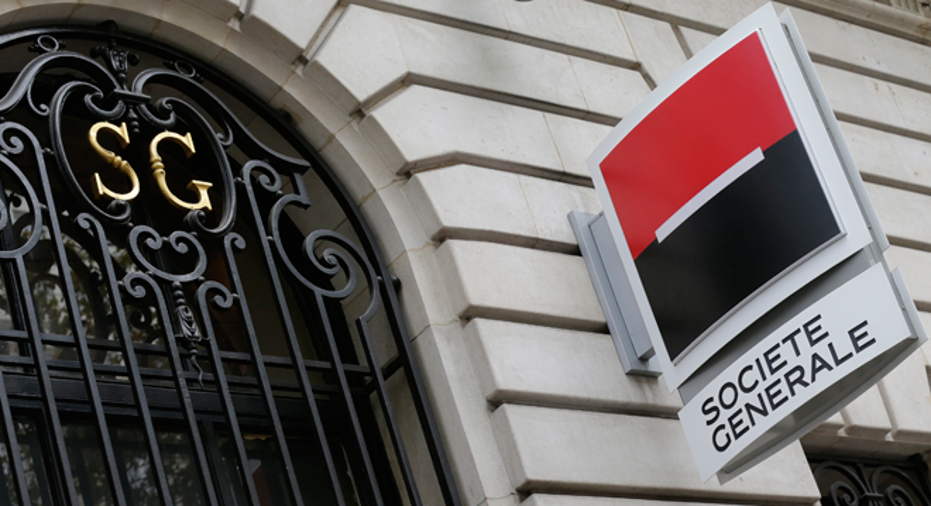SocGen Takes $731 Million Writedown On Russian Arm

Societe Generale, France's second-largest listed bank, has written down the acquisition value of Russian arm Rosbank by 525 million euros ($731 million), blaming the economic uncertainty caused by Russia's soured relations with Ukraine.
The writedown adds to the list of European companies to take a hit from the unrest in Ukraine between government forces and pro-Russian separatists, which has led the United States and Europe to impose sanctions against some Russian individuals and entities and to a slide in the value of the Russian rouble.
Danish brewer Carlsberg on Wednesday blamed the weak rouble and declining eastern European sales for missing first-quarter earnings forecasts.
The writedown to goodwill - effectively the premium paid for an acquisition - marks a blow to SocGen's ambitions in Russia, where it has poured billions into restructuring Rosbank in the face of competition from local state-owned rivals and the 2013 arrest of its top Russian executive on bribery charges.
SocGen said it expected to achieve a "satisfactory" double-digit percentage return-on-equity in Russia in 2016, effectively scrapping a previous target of over 15 percent in 2015, and said it would give an update on its three-year outlook for Russia on May 13.
Russia accounts for 3 percent of SocGen's loan exposure, or approximately 19.5 billion euros at end-December, the bank said.
"There are significant risks for SocGen in Russia," said Francois Chaulet, fund manager at Paris-based Montsegur Finance.
"But the writedown does look more like an accounting gesture ... None of this is insurmountable for SocGen."
SocGen is estimated to have spent over 4 billion euros on buying and restructuring Rosbank.
It did not put a value on the business on Wednesday.
SocGen shares were down 1.1 percent to 43.39 euros at 1025 GMT within a European banking index down 0.9 percent.
The International Monetary Fund has said Russia is already "experiencing recession" in part as a result of the economic uncertainty caused by the Ukraine crisis, while the Organisation for Economic Co-operation and Development has cut its economic growth forecast for Russia.
French banks have the biggest international exposure to Russia, led by SocGen, while Italy's Unicredit and Austria's Raiffeisen Bank International also have significant business in Russia.
SocGen Deputy Chief Executive Bernardo Sanchez Incera told journalists on a conference call that even though the Russian economy was seeing a slowdown there was no day-to-day tension in the country. SocGen is planning a raft of measures to improve profitability at Rosbank, he said, without giving more details.
PROFIT FALL
SocGen reported a 13.3 percent drop in first-quarter net income to 315 million euros, despite a 14 percent increase in revenue. Stripping out the writedown, SocGen's net income would have been 941 million euros, or higher than the 911 million average analyst forecast as compiled by Thomson Reuters I/B/E/S.
"Mediocre results which highlight low growth in France and risks in Russia," Mirabaud analyst Alex Potter said.
Larger French rival BNP Paribas also booked losses linked to the Ukraine crisis in the first quarter, though these were eclipsed by a warning it may be hit with a fine far higher than the $1.1 billion it has set aside to cover litigation costs linked to potential U.S. sanctions breaches.
Asked whether there might be litigation costs on the horizon for SocGen, like BNP, SocGen CEO Frederic Oudea told journalists there was nothing new to disclose for the first quarter.
SocGen, like rivals across the European banking industry, has been selling assets to bolster its balance sheet and improve profitability in an environment of slow growth in western Europe. It is targeting a return on equity (ROE) of 10 percent by end-2015 versus an underlying ROE of 8.4 percent in 2013.
Its core Tier 1 capital ratio under Basel III rules was 10.1 percent at end-March, versus 10 percent at end-December.
FIXED-INCOME PAIN
SocGen's corporate and investment bank, which is traditionally weighted more towards equities trading than fixed income, was not immune to the fixed-income slump that has hit rivals such as British bank Barclays.
SocGen said fixed-income revenue fell 25.3 percent in the first quarter, while equities revenue rose 9.3 percent. Overall, its investment banking and asset management division saw earnings drop 15.2 percent to 481 million euros.
French retail banking fared better thanks in part to a 28 percent drop in loan-loss provisions. SocGen's international retail bank, however, swung to a loss on the Russian charge.
SocGen is eyeing growth in online banking via a full takeover of its online brand Boursorama. Its offer to buy out minority shareholders will run from May 5 to May 16.



















